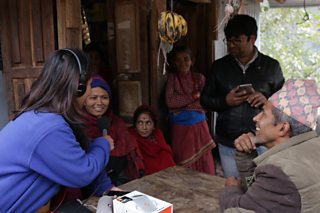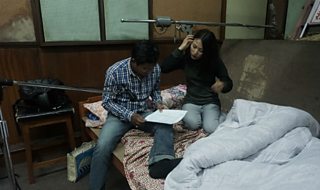The power of making drama out of a crisis
Pratibha Tuladhar
Senior Producer/Stakeholder Liaison, Βι¶ΉΤΌΕΔ Media Action, Nepal
Tagged with:
How radio drama helps earthquake affected communities in Nepal.
Harkhajit, 50, is a farmer from an earthquake-affected village in Nepal. He is saving to build a new house after the 2015 earthquake but doesn't have enough money. He's considering getting a loan from his relatives or neighbours.
“Why don’t you seek help from your neighbours to help build your house instead? Many villagers are using each other’s help to rebuild,” his aunt Bimla Kaki advises him when he approaches her for a loan. “You can help them build their house and they can help you. It will save you the stress of paying back a loan.”
After talking to more people, Harkhajit eventually decides to give up on getting a loan and reaches out to his fellow villagers who then help him rebuild his house.
This scene is from KathaMaala (Garland of Stories), a radio drama being co-produced by Radio Nepal and Βι¶ΉΤΌΕΔ Media Action to spark conversations – and action - within communities.
The five-minute episodes are broadcast as part of Milijuli Nepali, our radio programme providing people affected by the earthquake with practical information as they recover and rebuild.
During a recent trip the Milijuli Nepali production team, played the episode to community listeners group in Taruka, a village in Nuwakot district.

Collaborating and rebuilding
In Nepal, people help each other with work in the fields and construction, as well as during religious and social events, but building houses was something the residents of Taruka had not done for some time.
“We used to do arma-parma (community coming together to help each other) for building houses as well. From building the walls and the roof to carrying water, everything got done as a community, but we forgot about it over time,” said Rudra Prasad Dhakal after listening to the drama.
But listeners said that the drama had reminded them that it was still possible.
“It used to be a good way of sharing work in the olden days. You could ask neighbours to help you and offer to pay them with a meal and everyone would come out and help,” said an elderly woman who identified herself as Ambika. She said she had been living in a tin shelter with her husband since the earthquakes.
“It is actually going to be cheaper to do with the help of villagers, instead of bringing people from outside,” added another listener, Radha Shrestha.

Everyday realities in Nepal
Since the earthquake, most people have been living in temporary shelters in the villages so information about reconstruction is seen as valuable by those affected.
KathaMaala is now in its second series and has evolved to address the changing information needs of the audience. The first series followed the narrator, Maala, as she went from door to door selling milk. Her stories helped people see how they might cope better in the aftermath of earthquake. In the new series she has trained as a mason to rebuild homes in her village, becoming one of the first women in the country to take on a job that has been traditionally assigned to men. During a pilot episode, listeners said that Maala’s role was inspiring to men and served as a role model for women.
Daily life in Nepal has been difficult since the earthquake for people living in the worst-affected areas. The rural population depends greatly on radio as their source of information, and providing practical advice through radio drama is one of the most effective ways of communication.
KathaMaala is produced with support from and is broadcast on Radio Nepal at 8:15 am 12:15 pm, 6:15pm on Sundays, and at various times on 58 community radio stations across Nepal.
Βι¶ΉΤΌΕΔ Media Action does not receive funding from the Βι¶ΉΤΌΕΔ licence fee and depends on the generous support of donors.
Related links:
Follow us on , and
Go back to the
